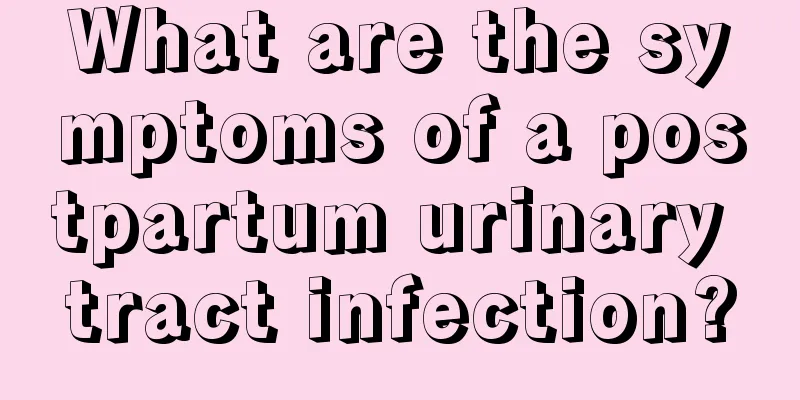What are the symptoms of a postpartum urinary tract infection?

|
Postpartum urinary tract infection in women is a relatively common disease. It is usually caused by the mother's failure to clean herself after delivery or the retention of urine caused by body secretions, which can easily block the urethra and cause urethral infection. Mothers with urethral infection are prone to vomiting, or lower abdominal pain, frequent urination, and painful urination, which require timely treatment. Symptoms of postpartum urinary tract infection 1. Pyelonephritis: Chills and high fever occur after delivery, with body temperature reaching above 39°C. Reflex vomiting and low back pain may occur, more commonly on the right side. The pain radiates along the ureter toward the bladder, so patients sometimes complain of lower abdominal pain. Some have symptoms of bladder irritation, such as frequent urination, urgency, and pain when urinating, and there is tenderness or percussion pain in the kidney area. Laboratory examination may reveal a large amount of bacteriuria. 2. Cystitis: The clinical manifestations of puerperal cystitis are basically the same as those of general non-pregnancy cystitis, including frequent urination, painful and urgent urination, and fever. There are frequent urination, painful urination, urgency, and fever. However, the symptoms of painful urination are more obvious, while the symptoms of urgency are milder, which may be related to the low bladder tension and poor sensitivity after childbirth. complication 1. Although acute cystitis does not cause complications, it can quickly affect the upper urinary tract through ascending infection. 40% of patients with acute pyelonephritis during pregnancy have symptoms of lower urinary tract infection before the onset of the disease. 2. Pregnancy complicated by acute pyelonephritis can lead to life-threatening complications, including multi-organ system dysfunction, including: (1) Endotoxemia and septic shock: Clinically, adverse signs such as excessive drop in body temperature (below 35°C) are often precursors to endotoxemia and septic shock, such as hypotension. (2) Anemia and thrombocytopenia: Lipopolysaccharide contained in Escherichia coli endotoxin destroys red blood cells and causes anemia. (3) Renal function impairment: decreased glomerular filtration rate and decreased creatinine clearance function. (4) Lung damage: Endotoxin damages the alveoli and causes pulmonary edema (varying degrees of respiratory insufficiency and even adult dyspnea syndrome). Disease diagnosis diagnosis 1. Pyelonephritis: Typical acute pyelonephritis is easy to diagnose based on medical history, physical signs and urine tests. For patients with chronic pyelonephritis, if they develop fever or upper respiratory tract infection after delivery, they should be alert to the possibility of acute attacks of pyelonephritis. Unilateral pyelonephritis, especially on the right side, often presents with right lower abdominal pain and vomiting, so it must be differentiated from appendicitis. 2. Cystitis: Since the clinical manifestations of cystitis in the postpartum period are basically the same as those in the non-pregnancy period, and it is often secondary to postpartum urinary retention, it is not difficult to diagnose. Differential Diagnosis Acute pyelonephritis generally has typical symptoms and abnormal urine findings, and is not difficult to diagnose. If there is only high fever but no obvious urinary tract symptoms, it should be differentiated from various febrile diseases. Those with obvious abdominal pain and back pain need to be differentiated from cholecystitis, appendicitis, pelvic inflammatory disease, perinephric abscess, etc. Generally, the diagnosis can be confirmed after multiple urine tests. The urinary tract symptoms of chronic pyelonephritis are not obvious, there is no obvious change in urine routine, or abnormal urine appears intermittently, which can easily be misdiagnosed. In women, anyone with unexplained fever, backache, fatigue, and mild urinary tract symptoms should consider the possibility of this disease, and repeated urine routine tests and cultures should be performed to look for evidence. Chronic pyelonephritis with hypertension must be differentiated from essential hypertension. In addition, it is necessary to differentiate from the following diseases. |
<<: Will urinary tract infection affect pregnancy?
>>: What are the symptoms of a urinary tract infection in pregnant women?
Recommend
Does a girl's initiative to pay mean that there is no result? What is the mentality of a girl who takes the initiative to pay?
We all know that many people often go out to eat ...
What is the reason for delayed menstruation and no leucorrhea?
There are many common diseases in women's bod...
How many months can babies swim? What should you pay attention to when taking your baby swimming?
When babies are in their mothers' wombs, they...
There is a meat ball at the cervix
If a woman has a small tumor in her cervix, she m...
What to do if your breasts hurt after feeding
I believe everyone knows the importance of breast...
The difference between pregnancy and premenstrual reaction
We all know that whether it is a woman's mens...
Large amounts of blood clots during menstruation
Large amounts of blood clots during menstruation ...
Precautions and dietary taboos during the postpartum period
It takes about a month for the uterus to recover ...
What should pregnant women do if they have a fever and cold?
Being sick is not a big problem for ordinary peop...
I'm having some contractions. Is it time to give birth?
Before the baby is about to be born, the pregnant...
What to eat to expel uterine waste
The waste in our body will be excreted after bein...
What to do if you are pregnant during breastfeeding
Breastfeeding is a feeding method that many mothe...
Can I eat chocolate after it melts and solidifies? How to store chocolate in summer
In summer, the surface temperature is too high. T...
Fudan University Research: Sleeping too much or too little affects health, 7 hours is just right | World Sleep Day
As one of the basic needs of human health, the im...
How to deal with postpartum body odor?
For a woman, giving birth to a child is the most ...









